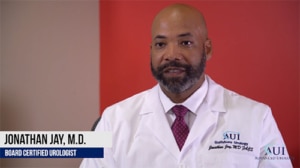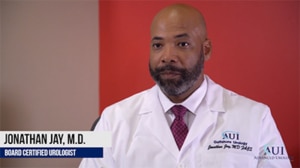Drs. Jay and Bassel, board-certified urologists in Naples and Palm Harbor, FL, respectively, talks about addressing common female urology problems.
Continue readingJanelle Bunce, PA-C: Why Advanced Urology Institute?
“AUI is a phenomenal single specialty practice where we can really focus on urology.” says Janelle Bunce, a physician assistant in Naples, FL
Continue readingAdvanced Urology Institute: Physician Assistants at AUI
Physician Assistants at AUI dedicate their time to diagnosis, treatment, and the infrastructure that makes their work possible and efficient.
Continue readingThe Impact of Radiation Therapy in Urological Care
Our urologists in Naples and Largo, FL provides a foundation for understanding the impact of radiation therapy in the realm of urology.
Continue readingUnparalleled Urology Care Awaits You at Naples Office
At our Naples Office, you’ll find an exceptional lineup of accomplished urologists and providers dedicated to patient care.
Continue readingHow to Treat Erectile Dysfunction with Dr. Rolando Rivera?
Are you having problems getting and keeping an erection for enjoyable and satisfying sexual intercourse? If so, you are not alone. And you shouldn’t be worried if it happened once or occurs rarely. Any man can have an occasional
Continue readingDr. Rolando Rivera of Advanced Urology Institute Re-designated as a UroLift Center of Excellence

Dr. Rolando Rivera of Advanced Urology Institute Re-designated as a UroLift Center of Excellence
About Dr. Rolando Rivera
Rolando Rivera, MD, FACS is an established Urologist in Naples, Florida, who features over two decades of experience in his field. Dr. Rivera’s acclaimed career in medicine began in 1996, when he graduated from the University of Puerto Rico School of Medicine in San Juan. Upon earning his Medical Degree, he completed an internship at Brooke Army Medical Center in San Antonio, Texas, before undertaking his residency at the University of Florida Shands Medical Center in Gainesville. Pursuing advanced medical training, Dr. Rivera then completed a fellowship in Female Urology, Pelvic Surgery and Urodynamics at the University of Miami.
About Advanced Urology Institute
As one of the largest full-service urology groups Florida, our 37 locations offer comprehensive urology services, from evaluation and pre-surgical preparation, to surgery and rehabilitation. We have evaluated numerous patients and performed thousands of urologic surgical and cancer procedures in the last decade with excellent outcomes. We are dedicated to combining clinical excellence, advanced technology, and patient- and family-centered care.
For more information contact AUI at: 855-977-4888
Congratulations to Dr. Jonathan Jay for being selected as Top Doctor in 2021 for Naples Illustrated Magazine

Congratulations to Dr. Jonathan Jay for being selected as Top Doctor in 2021 for Naples Illustrated Magazine
About Dr. Jonathan Jay
Dr. Jay received his Bachelor of Science degree in Physiology from Michigan State University, graduating with Honors. He went on to complete his medical education at the University of Michigan, Ann Arbor. He completed his residency training at Henry Ford Hospital before entering and completing his fellowship training at Beth Israel Deaconess Medical Center, Harvard Medical School in Boston. He received numerous honors and awards throughout his training, including Outstanding Resident Training Award and Lansing School District Distinguished Alumni Award.
He has made national presentations on various urological topics and has published multiple scientific papers in peer-reviewed journals as well as book chapters. He is involved in clinical research, including clinical trials for the minimally invasive correction of bladder control problems.
About Advanced Urology Institute
As one of the largest full-service urology groups Florida, our 37 locations offer comprehensive urology services, from evaluation and pre-surgical preparation, to surgery and rehabilitation. We have evaluated numerous patients and performed thousands of urologic surgical and cancer procedures in the last decade with excellent outcomes. We are dedicated to combining clinical excellence, advanced technology, and patient- and family-centered care.
For more information contact AUI at: 855-977-4888
Janelle Bunce, PA-C of Advanced Urology Institute Re-designated as a UroLift Center of Excellence

Congratulations to Janelle Bunce, PA-C on having been re-designated as a UroLift Center of Excellence in May 2021.
About Janelle Bunce, PA-C
Janelle Bunce PA-C is a nationally certified Physician Assistant who earned her Masters of Medical Science and Physician Assistant studies degrees at Nova Southeastern a University in Davie, FL in 2004. She is a member of the American Academy of Physician Assistants, Florida Urological Society and the American Urological Association. She has participated in multiple medical mission trips. Her specialties include adult and pediatric urology. She is currently a practicing physician assistant in Naples, FL.
About Advanced Urology Institute
As one of the largest full-service urology groups Florida, our 37 locations offer comprehensive urology services, from evaluation and pre-surgical preparation, to surgery and rehabilitation. We have evaluated numerous patients and performed thousands of urologic surgical and cancer procedures in the last decade with excellent outcomes. We are dedicated to combining clinical excellence, advanced technology, and patient- and family-centered care.
For more information contact AUI at: 855-977-4888
Dr. Jonathan Jay selected as the Top Urologist in Florida in May 2021 by Top Doctor Magazine

Congratulations to Dr. Jonathan Jay on having been selected as the top urologist in Florida in May 2021 by Top Doctor Magazine
Congratulations to Dr. Rolando Rivera for being selected as Top Doctor in April 2021 for Naples Illustrated

Congratulations to Dr. Rolando Rivera for being selected as Top Doctor in April 2021 for Naples Illustrated.
˙
Dr. Rivera also had an article titled Advanced Treatment for Overactive Bladder, published in Health & Wellness Magazine in April 2021.
















 This focused biopsy is called a
This focused biopsy is called a 
 One of the inevitable consequences of aging in women is urinary problems. With increasing age, the pelvic floor muscles—a group of muscles that support
One of the inevitable consequences of aging in women is urinary problems. With increasing age, the pelvic floor muscles—a group of muscles that support